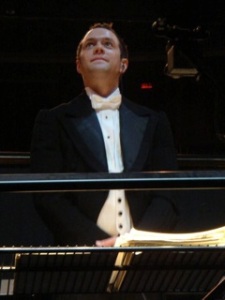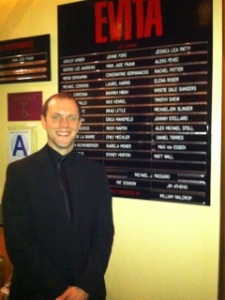
William Waldrop conducted the final performances of the Music Box Company’s “Phantom of the Opera” in Los Angeles. (Photo provided by William Waldrop)
By: Jacob Elyachar
From a very young age, William Waldrop was attracted to the magic of Broadway.
After listening to multiple cast albums and seeing a performance of Phantom of the Opera, he wanted to take control as a musical director.
Waldrop has worked on three classic Andrew Lloyd Webber productions plus is making original music with his songwriting partner: Robert “Bobby” Williamson.
During my recent trip to New York City, I had the opportunity to interview William and we talked about his interest in music, his current work as Evita’s Associate Conductor and his first collaboration with Robert Williamson.
Jacob Elyachar: How did you get interested in music?
William Waldrop: I had a lot of music surrounding me during my childhood. I started playing the piano when I was three-years-old. My mother was a piano teacher and she started teaching me piano. All of my sisters played the piano as well and I grew up playing classical music and church music. I started listening to music at my grandmother’s house. She had an old record player and one of the first show tunes that I listened to was “Do-Re-Mi” from the Sound of Music. While I listened to her records, I also watched the Lawrence Welk Show with my grandfather on Sunday nights and I also listened to him play folk songs on his guitar.
JE: When did you first get into conducting?
WW: I probably got interested in conducting when I first listened to and collected cast albums in junior high. I remember listening to Phantom of the Opera, Les Miserables and all of the big musical cast albums and then I remember going to see the Phantom of the Opera in Memphis and it was the first professional production I saw live. After seeing that show, I remember telling my mother that I wanted to be a part of that and she thought I wanted to be an actor and being on stage. However, I was watching the conductor and was so fascinated that he was the one in charge of everything going on and he was the reason why the music never stopped.
JE: If people had the chance to look over your resume, they would find that you worked on a lot of Andrew Lloyd Webber productions. In your opinion, what makes those shows so fascinating?
WW: I have been lucky to work on a lot of his shows because I have been working with the music supervisor, Kristen Blodgette, for a long time and hired me for his shows. I have been fortunate to work on them and while I worked on those productions, I realized that they are so timeless. Plus, all of Andrew Lloyd Webber’s shows have this specialized storytelling like Phantom of the Opera is very romantic and gothic while Sunset Boulevard is about the movies and there is something that he does with his collaborators that make people come see his shows again and again.
JE: One of your first experiences with Andrew Lloyd Webber’s music was with the national tour of CATS. How did you try to stand out as a musical director/conductor?
WW: I started with the show as a keyboard player and moved my way up. I learned the show from one of the show’s original music directors, Kristen Blodgette, who I work with now on Evita. I am a very detailed-oriented person and very much of a perfectionist and I began to really learn the ins and outs of the show.
When I had the opportunity to become the musical director of the show, it was almost an incredible task to keep and maintain all of those details and music, as it has been for 25 years. That was one of the things that helped me stand out was to really maintain all the details but still sustained the camaraderie with the 25 cast members.
JE: Let’s talk about Phantom of the Opera. You worked on two versions of the show: the Las Vegas 90-minute spectacular and the final Los Angeles show. What differentiated them?
WW: The Las Vegas production was about 90 minutes and it was a spectacular. It is probably one of the most beautiful things that I have ever seen and I was fortunate enough to work on that project. It was in a custom-built theatre and the chandelier was a $5,000,000 five-piece monster that moved around the whole theatre and it made you feel like you were in the Paris Opera House. Some of the music obviously had been cut but they streamlined the story so that you could get everything in 90 minutes. I think that it worked for a 90-miunte production in Vegas and lasted for six years.
The tour that I was involved with was the final leg of the Music Box Company, who had been out on the road for 17 years. That was the full version of what you see now and in many places across the world. Working on the tour was different because I was coming in as a replacement conductor, as I did in Vegas, but I had to learn the entire show and it was a very different learning process because it was something that had been there for many years and I had to learn the actors’ nuisances, pacing and musicality. I actually enjoyed that so much because I grew up listening to the music and the Music Box Company was actually the company I saw perform in Memphis.

William Waldrop is currently the Associate Conductor of “Evita” and helps not only stars Ricky Martin, Elena Roger and Michael Cerveris retain their music but also is responsible for conducting the show’s orchestra three times a week. (Photo provided by William Waldrop)
JE: You are currently the Associate Conductor of the current revival of Evita. As the Associate Conductor, what are some of the pressures that your job entails?
WW: I am responsible to conduct the orchestra two to three times a week so that it is a huge pressure and it is a high profile show. You have three huge stars: Ricky Martin, Elena Roger and Broadway veteran Michael Cerveris and you have this responsibility to maintain what our music director, Kristen, desires for the musical integrity of the show.
There is a lot of pressure on me because I am conducting the show two to three times a week and I do not get the receptiveness or have the opportunity to get into a groove. In addition, I am in charge of teaching the music to new people or maintaining the music with the actors. It’s a lot of music especially with the ensemble; they have a huge role in the show and maintaining that takes a lot of effort and time. I also serve as the pianist and vocal coach to Ricky Martin or Elena and that is a lot of pressure there because they are huge stars and they are wonderful people to work with and I enjoyed every minute of this experience.
JE: Outside of conducting “Evita,” you are part of an accomplished songwriting team with Robert Williamson. How did you guys meet?
WW: We actually met on the road during CATS. Bobby, as I call him, works at Creative Goods, which is a merchandising company that works with a lot of Broadway shows. He traveled with the tour and I met him there and we found out that we had a lot in common. He grew up in Mississippi like me, so we had that connection. He loves musicals obviously and was a singer like me. He went to Fordham University in New York and he started dabbling into cabaret singing. While we were on the road, we hung out and at one time, one of the dancers had appendicitis and she had to leave and he has a very specific comic wit and he suggested that we should write a poem and do something for her appendix.
He sent me this poem on the bus while we were traveling on the show’s Canadian winter tour and I immediately was connected to it. I wrote the music for it in two hours and when we got to the hotel, I played it for him on my keyboard and it was called “Love Perforation,” which was our first song and we started from there.
JE: Do you have any advice for people who want to go into either musical theater or composing?
WW: My advice as a musician is to get all of the training that you can get especially if you want to be a musician on Broadway. As a music director, you have to be a very good pianist, so if you are going to school for music make sure that you study piano and music theory and all of those things.
As a composer or someone who wants to write for the theater, I don’t even do this enough but going to see theater and make sure that you know what it is out there. By going to see shows, it inspires me to work harder and to know that I can get something out there and let people see it.
For more information about the revival of Evita, visit the show’s official Broadway site: http://www.evitaonbroadway.com/
To learn more about William’s work with Robert Williamson, click here: http://www.waldropandwilliamson.com/Waldrop_and_Williamson/home.html




